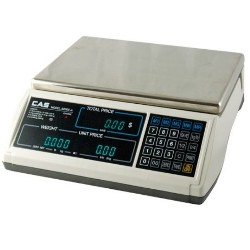This month I wanted to take a few minutes to answer a question that we get asked just about every month. “How often should I have my scale calibrated”? There probably is no exact right or wrong answer but remember this; virtually all scales and laboratory balances will go out of calibration eventually for various reasons. It could be due to general usage, shock loading, voltage surges, poor handling by an employee or a freight carrier. That’s why it’s essential that you have your scales checked on a regular basis. If you don’t have your scales checked at least a few times a year, you may be losing more accuracy than you realize.
According to Wikipedia, Calibration in measurement technology and metrology is the comparison of measurement values delivered by a device under test with those of a calibration standard of known accuracy. Such a standard could be another measurement device of known accuracy, a device generating the quantity to be measured such as a voltage, or a physical artefact, such as a metre ruler.
The outcome of the comparison can result in no significant error being noted on the device under test, a significant error being noted but no adjustment made, or an adjustment made to correct the error to an acceptable level. Strictly, the term calibration means just the act of comparison, and does not include any subsequent adjustment.
The calibration standard is normally traceable to a national standard held by a National Metrological Institute.
So getting back to the original question, so how do you determine the right calibration interval?
Here is how we see it. If you can afford to have your scales checked every month, then do it. Especially if product weight and accuracy are paramount to your business.
Beyond that, here is a chart to help you decide how often to have your scales calibrated. We base our numbers off how many actual hours you are using the scale(s).
| Hours The Scale(s) Used | Ideal Number of Calibration Appointments |
| 1 hour or less per day | One visit per year |
| 1 to 3 hours per day | Two visits per year |
| 4 to 5 hours per day | Four (Quarterly) visits per year |
| 6+ hours per day | Twelve (Monthly) visits per year |
This is just our opinion on how often you should have your scales calibrated. You certainly can have your scales checked more or less frequently. One good resource to consider on this topic is the scale manufacturer of your item(s) that you own. They can probably let you know generally how often they recommend calibration service. Of course you want your calibrations done by a reputable company who uses high quality and accurate test weights.
Another point I wanted to make regarding this subject is the standard used for testing your scale. Most scale companies follow the rules outlined in Handbook 44. This includes Specifications, Tolerances, and Other Technical Requirements for Weighing and Measuring Devices.
When it comes to buying scales…. One point I did want to make while we’re discussing this topic is buying scales online through the internet. Purchasing your scales and weighing equipment online is very easy and time saving. The scales usually arrive in good working order and you often get a good deal.
However, please keep in mind that we highly recommend that when you purchase a scale online, that once you receive the scale, please have it tested and calibrated by a local company in your area.
In fact, in some instances your state might actually require that you do this. We recommend that you have your scale checked before you use it because often times even though we have the scale calibrated before shipment, calibration can change for various reasons between the warehouse and your location.
So when you ask, how often should I have my scales calibrated?
Remember having a scale calibration program in place is ultimately a good thing for you. Yes, there will be some additional expenses but having your scales checked regularly often leads to extending the life of your weighing equipment, reducing product downtime, increased accuracy, and ensuring state and local regulatory compliance. If you need some recommended calibration providers in your area, contact us.
